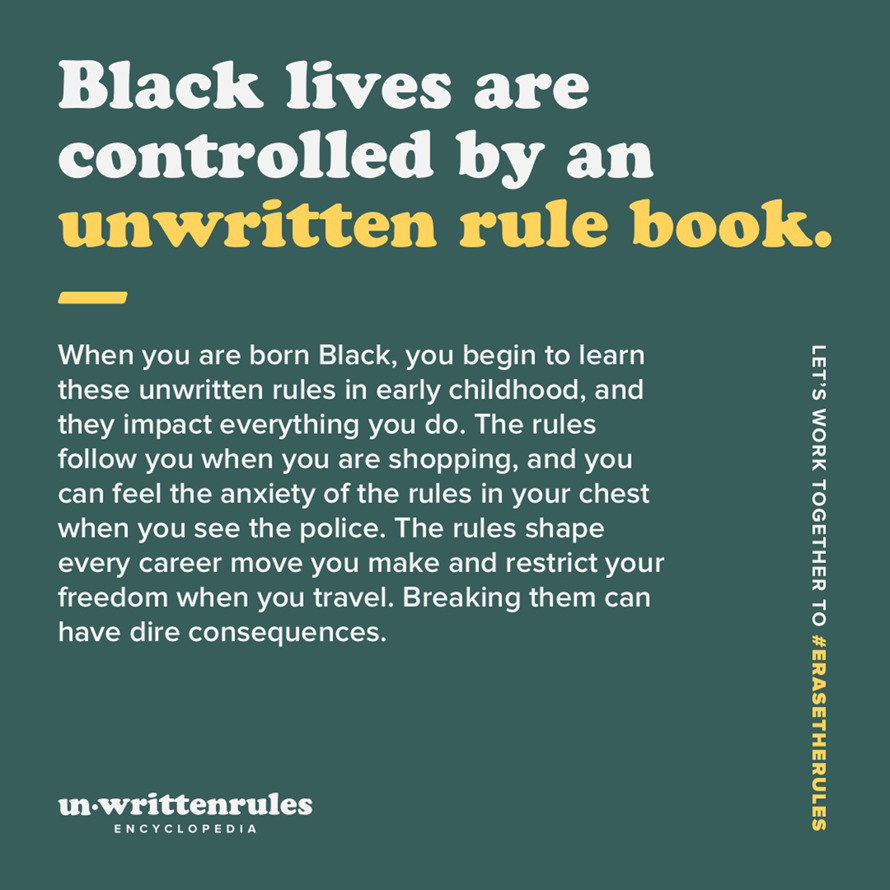As a child, Alex Pierce was not allowed to play with toy guns or anything that resembled them. Even Nerf guns were off limits.
“My mom was super strict about that,” recalls Pierce, an associate creative director at Hawkeye, an agency based in Dallas. “At the time, I was so upset about it. As an adult, I understood what she was doing.”
Pierce is one of several creators behind “Unwritten Rules,” an online encyclopedia of 12 ways in which racism manifests in Black people’s lives, often forcing them to adhere to an unspoken code of conduct.
“Black lives are controlled by an unwritten rule book,” the site reads. Rule No. 1? Don’t play with toy guns. Others include “never leave home without an ID,” “always have a receipt and a bag when you leave a store,” and “don’t have a name that’s too Black.”
Each rule has a short explainer that summarizes how it typically impacts Black people, as well as links to real-life examples. All 12 are paired with links that direct visitors to articles, petitions, podcasts and other ways to learn more or take action.

Finding an outlet
According to Pierce, the project came about last year following the May 25 police killing of George Floyd in Minneapolis. Pierce called it a “tipping point” for him.
“No one deserves to die like that,” he said. “It was very painful.”
Shortly afterward, Pierce talked with his group creative director, team members and friends about what they could do to express their frustration and “find an outlet to truly represent how we were feeling.”
While brainstorming, they kept returning to the Green Book, a travel guide published between the 1930s and 1960s that listed which hotels, restaurants and businesses would welcome Black people.

The Green Book inspired them to create a guide of their own, one that would outline the many unofficial—but very real—rules that Black individuals take into account every day as they go about their lives.
“Personally, I live my entire life prescribed to a certain set of rules that were ingrained in me by my mother and family at a young age,” he explained. “These are our rules, and they’re not necessarily formalized. It isn’t like there’s a Black handbook that you get when you’re born.”
Providing resources
Pierce considers himself to be a “very pragmatic man.” Thus, he wanted the project to point out the problem and provide ways for people to “erase” the aforementioned rules.
“I don’t just want to tell people how I feel about something,” he said. “I want to help correct the behavior. Generating empathy was one of the goals, but we also wanted to turn the corner and make sure that we were asking the person to do something about it.”
That’s why each rule listed on the site includes several ways visitors can educate themselves or help. For instance, rule No. 2—”make sure your hair always looks professional”—contains links to articles, books and podcasts about Black hair and its history of being stigmatized.
Additionally, each rule points visitors to various petitions, charities and resources related to the topic in question. Rule No. 2 directs people to dozens of options, such as a petition that seeks to “end hair discrimination against Black people across the country.”
The site also includes a Shared Stories section, giving Black people the chance to submit an anonymous story that highlights a rule they’ve been “unjustly asked to live by.” Selected stories will be posted on the “Unwritten Rules” site, its Instagram and in an upcoming book.
https://www.adweek.com/agencies/unofficial-rules-black-people-feel-obligated-to-follow/

